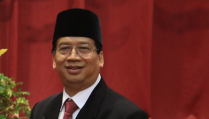
Virtual Conference on November 13, 2021
Challenges on Population Data Security, Demographic Behaviour and Transformation in the Openness Era
Keynote Speakers:

Prof. Dr. H. Jamal Wiwoho, SH,M.Hum.
Rector of Universitas Sebelas Maret, Indonesia
Prof. Wolfgang Lutz
Leader of the World Population Program of the
International Institute for Applied Systems Analysis (IIASA), Austria


Assoc. Prof. Noor Zaman Jhanjhi, Ph.D.
Director Center for Smart Society 5.0 CSS5
Cluster Head for Cybersecurity Research Cluster
School of Computer Science and Engineering, Taylor’s University, Malaysia
Prof. Dr. Zudan Arif Fakrulloh
Direktur Jenderal Dukcapil, Indonesia


Jonathan Marskell
Co-Task Team Leader ID4D Indonesia
Rezzy Eko Caraka, Ph.D.
Seoul National University, South Korea

Massive development of the internet in the current era of openness delivers enormous benefits for easy access to information for both individual users, groups and governments. However on the other hand, this development has also resulted in various types of challenges with certain consequences, one of the challenges is guaranteeing the security of access to personal data. The important role of personal data is to complete individual rights, such as in obtaining social security, banking services, conducting general elections and others, as in this case the presence of the state in participating in ensuring the confidentiality of personal data is very necessary. The State through the 1945 Constitution of the Republic of Indonesia in Article 28G clearly stipulates “every person has the right on protection for his/herself, family, honor, dignity, and property of objects that under his/her power, and entitled on a sense of safe and protection from the threat of fear to do or not to do something which is a human right”.
Along with the development of information through the internet, technology continues to find various applications and various variations of new technology. Technological growth is directly align to development growth and impulsively drives population movement. As the object and subject of development, the population is recognized, identified, sorted and analyzed as the development policies implemented capable to be targeted. Population data and information thus occupy a very strategic position. Through Law Number 52 of 2009 on the Population Development and Family Development, the central government and local one are given the mandate to collect, process and present data and information on population and family. These efforts can be done through censuses, surveys and family data collection.
One of the developed and applied technologies is the development of Big Data technology. Big Data technology utilized to improve public services provided by the government. The development of this technology consistently utilized to build a complete and centralized database in a single identity. In its implementation, the government has opportunities and challenges to take advantage of this technology. Some of the challenges are related to data security and the community’s perspective on managing their population data. Therefore, it is necessary to conduct a more in-depth study of the application of this technology from various scientific sides to address the opportunities and challenges, especially regarding the security of population data and the behavior of the society towards the guarantee of population data which is managed in the current era of openness.
Based on the background above, the D-4 Demographic and Civil Registration Study Program, Sebelas Maret University, Surakarta Vocational School will hosting an Online International Seminar on Demography and Civil Registration with main theme: “Challenges on Population Data Security, Demographic Behavior and Transformation in the Openness Era”.
Scopes
-
Big Data
- Computational Methods
- Cultural and Ideological Change
- Data Security
- Demography, including the social sciences, the life sciences, mathematics and statistics, policy research, and research on the discipline itself
- Digital Economy
- Environment
- Environmental Law
- Homelessness
- International Law
- Migration
- Public Health
- Social Movements
- Social Networks
- Social Organizations and Social Governance
- Social Security
- Social Stratification / Social Inequality
- Statistics
- Taxation
Publication
Submitted papers will be reviewed by scientific committees and assigned to oral video presentations. According to the reviewers recommendation, the selected papers will be recommended for publication in Web of Science indexed proceeding.

Checkpoints
| Important Steps | Date |
|---|---|
| Registration of Parcipants | November 12, 2021 |
| Participants Payment Deadline | November 12, 2021 |
| Registration of Presenter | Oktober 31, 2021 |
| Abstract Submission Deadline | Oktober 31, 2021 |
| Presenter Payment Deadline | November 5, 2021 |




